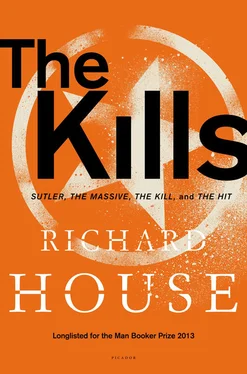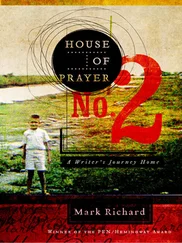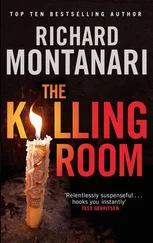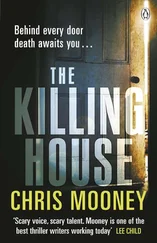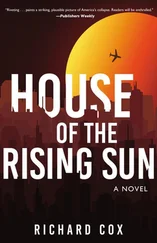* * *
Grüner could not be precise on the time. The men left, then returned, but neither would speak with him. After another hour, possibly longer, a woman ambled into the room with tea and a modest lunch. He strained to see if it was still light outside, but the open door gave only a view of a wood-panelled corridor. The woman, old and small, with a thin black headscarf, asked the brothers in Turkish if their guest would like something to eat, and Grüner begged her in German, English, and poorly conjugated Turkish to call the police.
‘My wife,’ he pleaded, ‘my mother will be worried.’ In this he sounded sincere.
The woman backed out of the room and the brothers followed after, explaining rapidly that this wasn’t anything she should worry about. Hurry, hurry, hurry, they chided as the door swung closed behind them, they would like coffee.
When the younger brother returned he asked Grüner if he liked films. ‘When I am studying,’ he said, ‘I watch two every day. Every day. It is important to educate yourself. Good for your language, but necessary so that you can follow the narrative, learn the tricks for making films because there are rules.’
‘Is your brother making you do this? I have money. I can pay you. You can buy lots of films. DVDs. I have films at my hotel I can give you. I’m telling the truth. I have many, many films. If you let me go, I won’t tell anyone. I will give you films. Many films.’
When the older brother returned the younger brother fell back into his thoughts.
‘What was he talking about?’
‘He doesn’t watch films.’
The older brother set his hand on his brother’s shoulder as he lowered himself to the floor. They sat side by side. ‘He’s lying. Everybody likes a good film,’ and then to Grüner, ‘My brother will one day write many great films. Our tastes are very different.’ The man shook his head. ‘You must watch films?’
Grüner refused to answer.
‘Herzog? Wenders? Fassbinder?’ The older brother waited for a reply. The man became animated, he stood up and brushed dust from his trousers. ‘I will let you walk out of here now if you can tell me one joke from a Fassbinder movie. One joke. You don’t need to make me laugh. One joke and you can walk free.’
Grüner kept his mouth shut and glowered at the man.
‘All right. I will give you another opportunity. Do you think my brother is handsome? His mouth, no? Don’t you think he has a pretty mouth? I can say without bias that this is a handsome mouth. Perhaps you would like to kiss him?’
With no idea how to answer Grüner closed his eyes and rolled back his head.
The older brother leaned forward with both hands on the armrests. ‘I don’t know, Mr Journalist. I have tried to like you. Honestly, I have tried, but I don’t seem to be able to connect with you. You are a hard man to understand, you know that? I need that knife now.’
4.6
Ford collected his backpack from his room. On his way through the lobby he asked the clerk about the tours along the Bosporus. The clerk, turned to a TV on the counter beside him, cocked his head as Ford asked: How far did they go? How regular? How much did they cost? Did he have any brochures? A leaflet perhaps in his office? He said that he was interested, not for today but maybe tomorrow, if there was something in the morning. He wanted to stay another two nights, and when he came back in the evening he would settle what he owed. There were no leaflets, he said repeating himself, nothing about the trips. The clerk sloped back to his office. It was possible that they had some information somewhere about the trips.
When the clerk returned to the office Ford reached over the counter and opened the desk drawer. He shuffled through the passports until he recognized his own. One eye on the clerk’s legs and backside as he leaned into his office and searched for the leaflets.
He slipped the passport into his pocket before the man returned, and waited for the leaflet. On the TV on the back counter he saw the news, a banner tagline on CNN slipped along the frame: Iraq — enquiry.
* * *
He walked from the hotel to the port as the day finally gave way to night. His stride shortened where the road became steeper, his mood — a certain anxiety about boarding the ferry, about showing his passport and passing through security, about how he would answer if he was challenged — underscored with a hint of optimism, a buzz at leaving Turkey. He liked being on the move, was happy to leave, and felt with this next step a welcome delay in his return to Europe. Malta was a good idea: he would meet Eric, resolve his trouble with the missing account numbers, lie low in a villa, remain undiscovered. Covert. Secure. The decision came to him, clear and true. I don’t need to return to Bonn. Everything I need to do can be done in Malta. As Sutler, Ford had succeeded in areas he never could have approached as John Jacob Ford. Why return to Bonn — he couldn’t properly decide in his future — but why would he return to settle the small debts and rents he owed in his absence, considering the amount money he had coming to him? Why give money to banks and corporations? Hadn’t they already accounted for their losses? Hadn’t they written him off? Why surrender this advantage? He was skirting Europe, from Istanbul to Malta, it wasn’t by coincidence; he could see now that his actions held an instinctive logic.
The ferry sat at the quay as Zubenko had promised, and as he came down the hill overlooking the docks Ford could see that the traffic was light. The ferry’s flank overshadowed the quay and arcs of light glanced across the security-booth walls, a small huddle of scuffed white buildings; all a little mournful, as if abandoned. The air by the water reeked of bitter-sweet diesel fumes.
Signs in Turkish and English warned of an increase in security, but he found only two guards, and when he offered his passport and ticket they waved him through without interest. The ease of this disturbed him.
He walked onto the boat without seeing any staff or personnel. On the lower deck he passed behind a solitary cleaner, headphones clapped over her ears as she huffed the machine forward, cleaning the grey linoleum floor and leaving it slick. He found the cabin unlocked and walked into a room of moulded plastic, beige and red, with rounded edges, no window, a draw-down bunk, the air icy from the air conditioning.
In Malta he would find Eric’s villa, find Eric, retrieve his money, and revisit the idea that he didn’t have to be Ford, hadn’t Sutler demonstrated this possibility? He could become someone new.
* * *
The late summer morning brought rain to Istanbul and he watched the city fall slowly away. He kept his eye on the domes and minarets — a view of steel greys and greens — and felt, despite his pleasure to be leaving, a slight regret. Departures, he told himself, are always melancholic. Passengers crowded the saloons, a few solitary figures lined the wet decks, and cowered under coats and plastic sheeting. The ferry’s wake curved back to the port, white, almost fluorescent in the darkening sea. He faced the stern with Europe to his left and Asia to his right, and felt momentarily unstable, an element in constant motion. A tour boat followed them out. The tour guide’s voice amplified tinny and clear over the water narrated the view. On the opposite bank lay the palace of the last Sultan. Ahead, the Byzantine fortifications. On top of the hill the Topkapi Palace, beside it Aya Sofya. The first Ottoman Emperor, Mehmet the Second, had looked upon the same rump of hills six hundred years ago. He besieged the city, starved it, then pummelled its tough protective walls with a cannon dragged from the outskirts of Vienna. Such is history.
Читать дальше
